We are thrilled to share with you the achievements of Rainforest Foundation US’s (RFUS) work over the past year. Our efforts in the areas of territorial protection, land rights, and capacity strengthening have made significant impacts throughout a number of regions. We invite you to join us in celebrating these successes and reflecting on the challenges that lie ahead.
One of our major accomplishments was the expansion of our innovative territorial monitoring program, Rainforest Alert. This cutting-edge initiative has enabled our Indigenous partners to enhance their ability to safeguard the cherished ecosystems of South and Central America. Through advanced technology and collaborative partnerships, we have been able to support Indigenous communities to detect threats to their territories and address them more effectively.
Respecting Indigenous peoples’ rights to free, prior, and informed consent is also paramount to our mission. In Guyana, we proudly supported the development of a national consultation framework for legislative changes. This framework serves as a crucial step toward ensuring Indigenous communities’ voices are heard and their rights are upheld.
Additionally, we provided comprehensive training to emerging leaders in Mexico and Central America. We helped equip these future advocates with the skills and knowledge they need to protect their communities and their ancestral lands.
Despite our achievements, it is essential to acknowledge the ongoing crises gripping Central and South America. The fires that ravaged the Brazilian Amazon in 2022 serve as a stark reminder of the urgent need for action. Tragically, Indigenous environmental defenders continue to face alarming rates of violence, and land rights violations persist in Indigenous communities worldwide.
Isolated, small-scale interventions are no longer sufficient to face these challenges. Preserving our forests and addressing the climate crisis requires us to act boldly and collaborate broadly. We must all work hand in hand with local Indigenous partners, expanding upon successful models of rights-based forest protection. Only through close collaboration and coordination can we prevent the collapse of crucial forest ecosystems in Central and South America, and ensure the long-term sustainability of Indigenous peoples’ territories.
We are filled with enthusiasm about the opportunities ahead. In 2023, we will expand our support of territorial monitoring work with communities in Peru, Brazil, and Ecuador. In Guyana, we will continue our advocacy efforts to ensure the Guyanese government’s engagement in carbon markets respects Indigenous peoples’ rights. Moreover, we remain committed to equipping Indigenous communities with the tools and knowledge necessary to recommend substantive legislative reforms that protect their rights. And we will continue supporting the institutional strengthening of Indigenous governance bodies in Central and South America, as well as creating training programs that facilitate the expansion of land management planning and monitoring in the region.
None of this year’s achievements would have been possible without the generous support of our donors. Your contributions play a pivotal role in ensuring that Indigenous communities’ rights are respected and asserted. By adequately financing their institutions, we enable our Indigenous partners to build sustainable and resilient families and communities.
Together, we can make a lasting impact and create a better future for Indigenous peoples in South and Central America. Your generosity equips our Indigenous partners with the necessary tools, skills, and resources to protect their territories, reduce deforestation, and safeguard the invaluable biodiversity we all depend on.
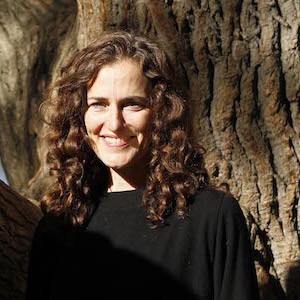

Suzanne Pelletier
Executive Director
Rainforest Foundation US
In 2022, thanks to the support of donors around the world, Rainforest Foundation US (RFUS) expanded vital programming and ensured necessary funds reached Indigenous communities—the rainforests’ best guardians—throughout Central and South America. You can read about some of these achievements on the following pages.
The impacts of our work in our three priority areas—land rights, territorial protection, and organizational strengthening—will be seen and felt for years to come.
We support Indigenous peoples in their fight for legal recognition of their traditional lands.
RFUS believes that to protect and sustain the world’s tropical rainforests, we must recognize the rights of the Indigenous peoples who have been responsibly stewarding these forests for centuries and make those rights effective on the ground. We assist our partners on the ground in advancing land rights, as well as advocating for national and international policy change involving Indigenous peoples’ rights to their lands and forests.
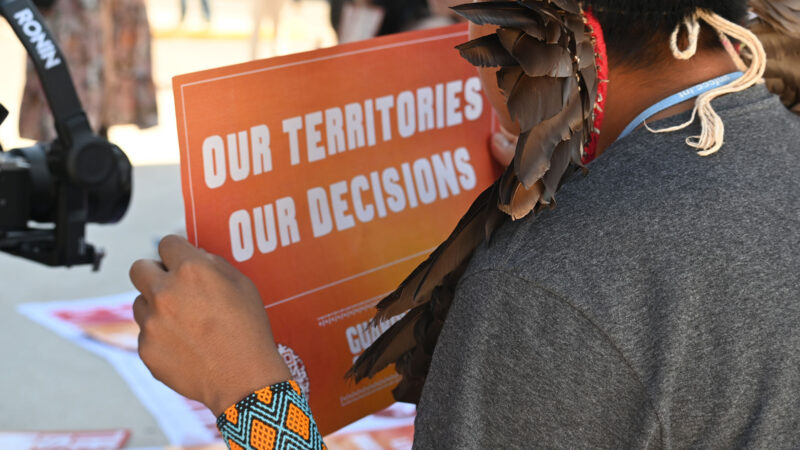
In the process of revising the Amerindian Act—national legislation that provides for the collective rights, governance, and titling of Indigenous lands in Guyana—the government of Guyana has undertaken to consult all Indigenous villages. However, government consultations are not historically conducted in a manner that fully respects Indigenous peoples’ rights. To address this, Indigenous representatives throughout Guyana—with support from RFUS, the Amerindian Peoples Association (APA), and Forest Peoples Programme—developed an Amerindian Act Consultation Proposal. This proposal outlines how Indigenous peoples expect to be consulted by the government of Guyana in the process of legislative reform. It was endorsed by all district councils, Indigenous governance bodies that represent villages, and was submitted to the government in an attempt to ensure that Indigenous peoples’ rights to participate in decision making—and to free, prior, and informed consent—are respected when revising the Amerindian Act.
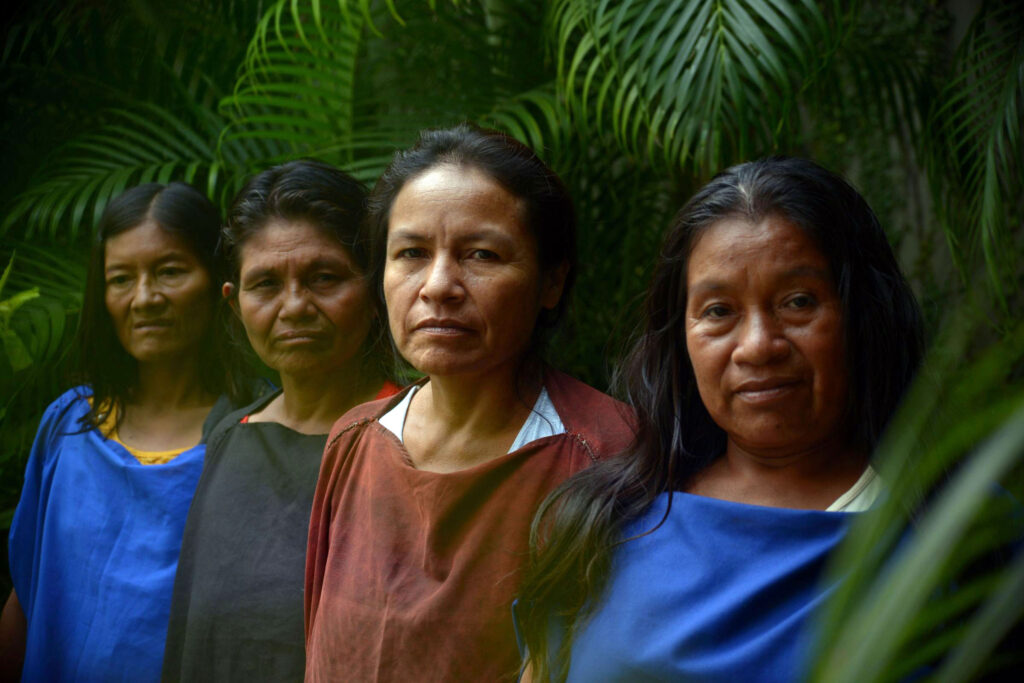
RFUS has advocated for more than eight years with the community of Saweto in Peru and the widows of four Indigenous environmental activists who were assassinated in 2014. Partnering with local leaders and lawyers, our advocacy efforts ensured that this case continued to be in the international spotlight and that these murders were tried as an organized crime. This means that those who ordered the killings are also held accountable, not just the triggermen. In 2022, the Superior Court of Justice in Ucayali, Peru, finally began the criminal trial of the alleged killers of the four victims, who had been engaged in a years-long struggle to stop a multinational logging company from illegally deforesting their territory. And for the first time in Latin America, the triggermen and industry executives are all being held accountable in this pivotal case that stands to have an impact on other similar trials throughout the region.
We provide resources for strong forest governance and cutting-edge monitoring tools so Indigenous peoples can more effectively protect their rainforests from intruders and have greater control over what happens in their territory.
Our territorial monitoring program, Rainforest Alert, provides training, tools, and financial support to Indigenous organizations to map, monitor, and secure their territories using cost-effective technology like smartphones and drones. The methodology—developed with partner organizations in the field—integrates forest monitoring with strengthening decision-making processes and direct engagement with relevant government agencies, for a more effective and holistic approach.
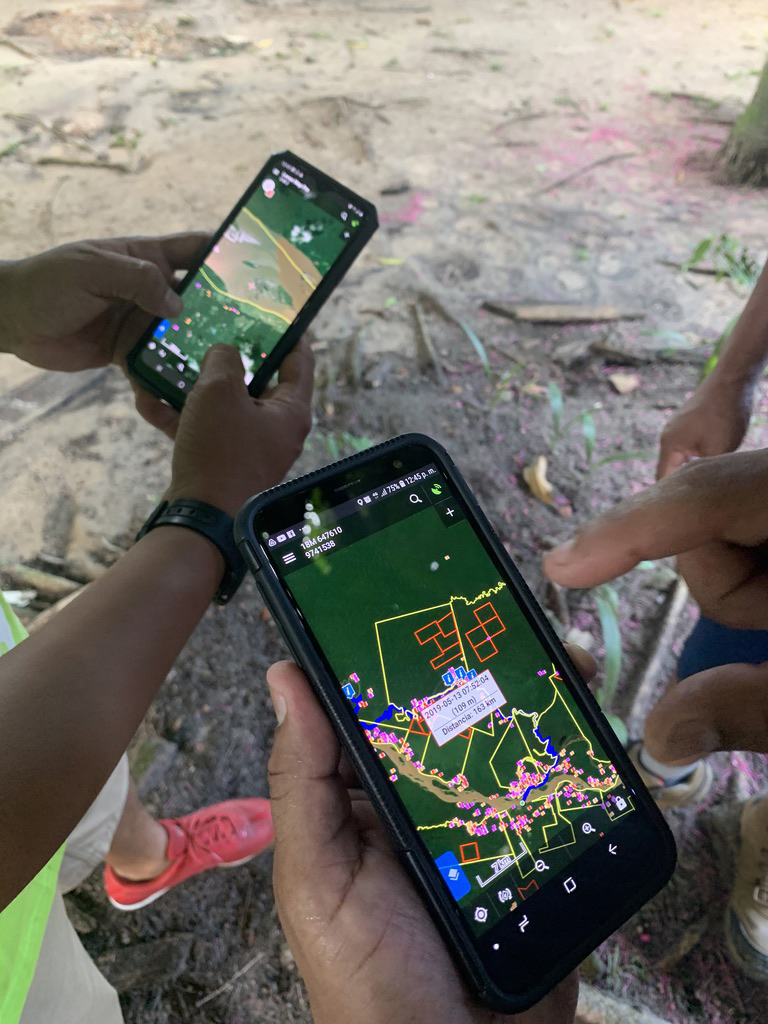
After a peer-reviewed study showed that RFUS’s territorial monitoring program, Rainforest Alert, reduced deforestation by more than 50% in its first year of implementation, we expanded the program to 36 new communities in 2022 throughout the Peruvian Amazon. RFUS conducted more than 23 trainings and supported more than 117 forest monitors this year.
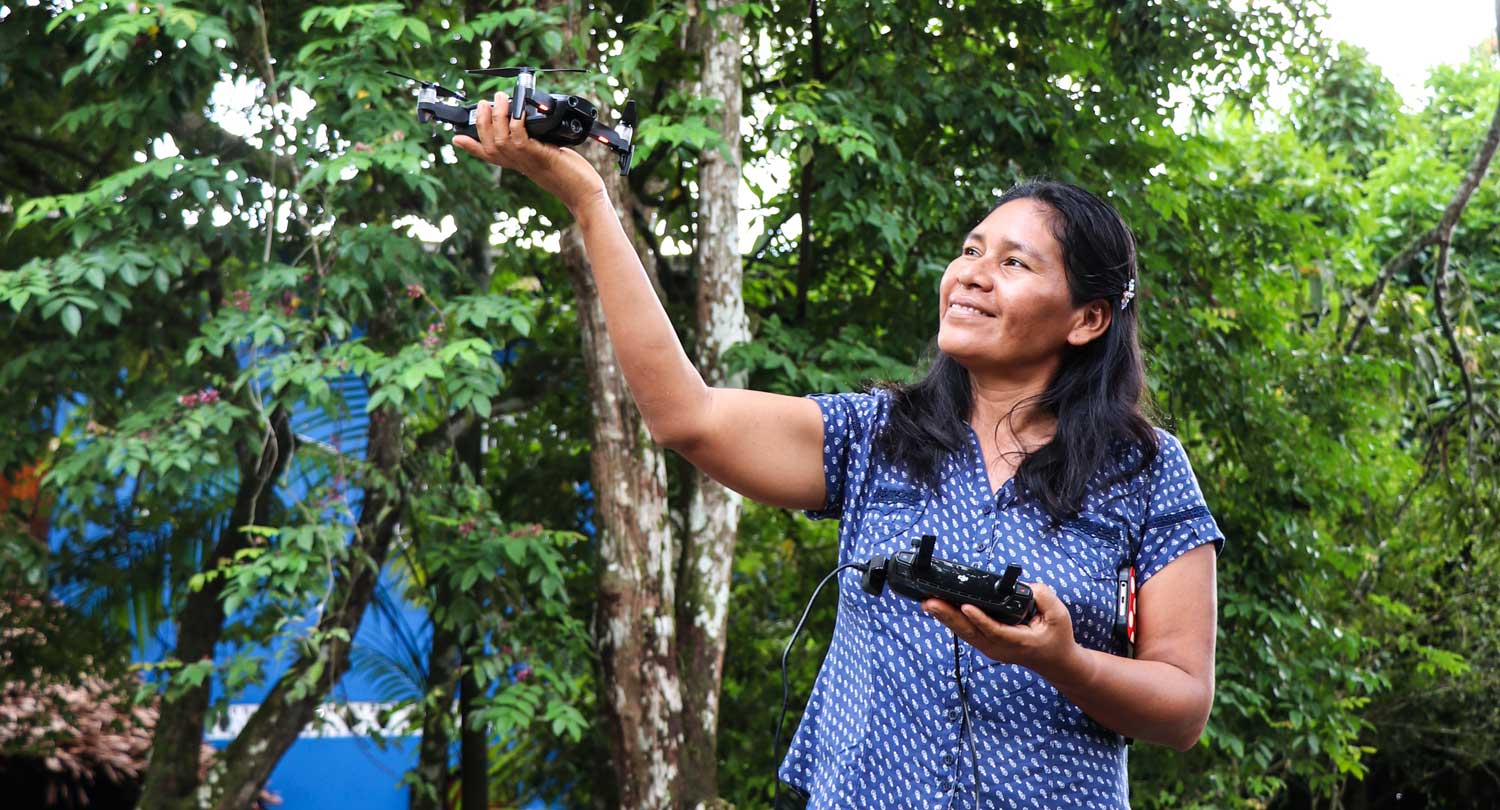
We introduced a pioneering program that offers biannual payments to participating communities in recognition for their successful forest defense. In 2022, we dispersed the first of these payments, totaling $447,000 among 26 communities. With these much-needed funds, community members tasked with some of the world’s most important environmental defense work are better able to stand up to exploitative, extractive activity on their lands. They can take necessary steps to create sustainable livelihoods by addressing community-wide infrastructural deficiencies, such as lack of potable water or electricity. Some communities used their payments to apply for land titles—a critical step for all communities to be able to effectively protect their territories.
We provide direct financial support and trainings to our partners upon request, to strengthen the skills they need to lead initiatives to assert, secure, and defend their rights.
Trainings include financial management, proposal writing and grant reporting, project implementation, communications and advocacy, as well as bigger-picture governance, and land and forest management strategies. With this support, our Indigenous partners are better equipped to advocate on their own behalf to government agencies responsible for forest and climate policies, as well as for the recognition and implementation of their territorial rights.
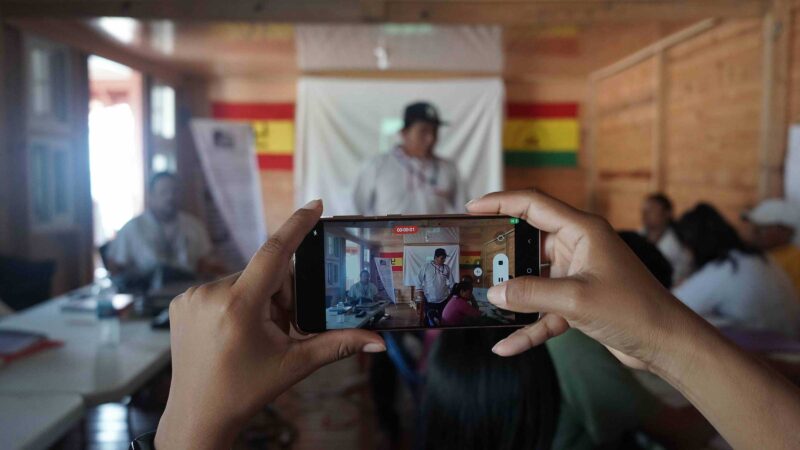
With support from RFUS and funding from USAID, the Mesoamerican Alliance of Peoples and Forests (AMPB)—a coalition of 11 national Indigenous and local community organizations—expanded the presence of AMPB’s Mesoamerican Leadership School in Guatemala and Honduras. They also established new programming in Mexico. The school is an investment in retaining and galvanizing Indigenous youth, whose participation is necessary for the survival of the Indigenous peoples’ environmental movement and Indigenous communities.
“It’s such a unique space and experience,” says Q’eqchi’ Maya activist and teacher Carolina Alvarado from Guatemala. “I like collaborating with the youth, to help them build towards a better country without losing their sense of identity.”
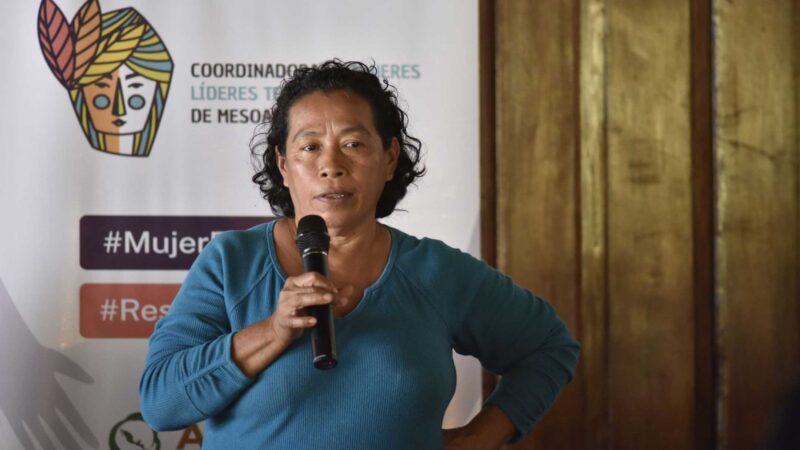
Despite the critical role Indigenous women play in rainforest protection, including promoting resilience through traditional medicine and regenerative agriculture, they face challenges that have historically excluded them from participating in important decision-making and policy discussions. In 2022, RFUS and the Mesoamerican Alliance of Peoples and Forests developed a climate and gender strategy alongside the Coordination of Territorial Women Leaders of Mesoamerica, which aims to increase participation of women in all political spaces. The strategy addresses the intersection of gender, climate change impacts, forest protection, and sustainable livelihoods in the region. As women throughout Central and South America unite to fight for their rights and the health of the planet, the climate and gender strategy will support sustainability and gender inclusion in all aspects of governance.
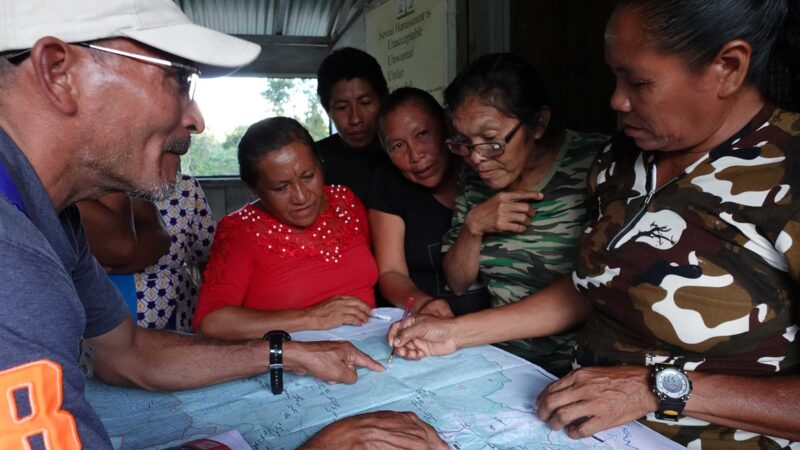
RFUS supported the South Rupununi District Council in developing a community paralegal program centering Indigenous communities in their fight for justice in Guyana. This work includes collaborating with partners to assist community paralegals to know, use, and shape the law to defend their ancestral lands, as well as protect their rights. It involves sharing legal knowledge and providing skills training to grassroots advocates who then build the legal empowerment of community members in remote villages. Informed Indigenous communities who know their rights are better equipped to fight for them.
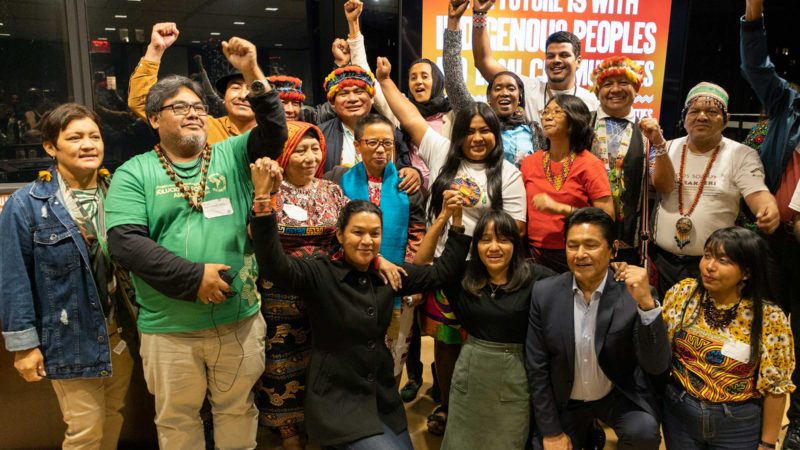
During the United Nations’ Conference of Parties (COP26) held in Glasgow in 2021, $1.7 billion was pledged for Indigenous organizations and communities defending the forests. This followed recent research by our sister organization in Norway showing that historically, Indigenous communities receive less than 1% of climate funding. In this context, one of RFUS’s Indigenous partner organizations—the Mesoamerican Alliance of Peoples and Forests—established the Mesoamerican Territorial Fund (FTM). We helped the FTM solidify its governance structure and procedures to ensure that it can provide its first grants to Indigenous communities throughout Central America and Mexico in 2023.
Additionally, RFUS partnered with the Global Alliance of Territorial Communities (GATC)—a coalition of the main representative federations from the tropical forests of the world—in its launch of the Shandia Platform. This high-visibility initiative, showcased during New York Climate Week in September 2022 and COP27 in Sharm-el-Sheikh, Egypt, will help ensure that funding pledged by governments and private donors is distributed to millions of people living in forest communities by flowing through new Indigenous and community-led territorial funds. These territorial funds, such as the FTM in Mesoamerica, currently exist in the Amazon, Indonesia, and are being established in the Congo Basin.


8 Communities served
74K Acres monitored
57 Communities served
506K Acres monitored
104K Acres land rights advanced
10.1M Acres monitored
7.9M Acres land rights advanced
7 Communities served
1.5M Acres monitored
1.2M Acres land rights advanced
50+ Communities served
Acres monitored
Communities served
Acres land rights advanced
+
Several hundred community members and Indigenous leaders trained
Meet a few RFUS team members who offer a glimpse into their work and describe their commitment to our mission.
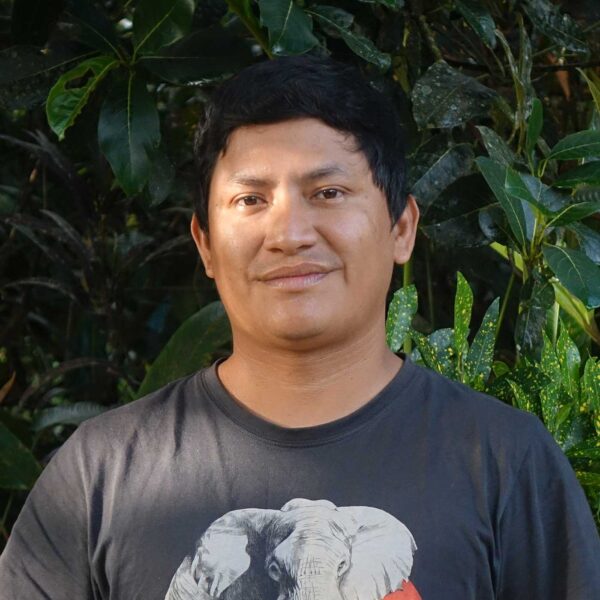
I discovered my love for the Amazon when my professor parents brought me to the rural communities near Iquitos, Peru, when I was off from school. Now, I’m an engineer in tropical forest ecology. I work in Peru on Indigenous land monitoring and I lead trainings to improve governance, territorial control, and threat reduction within forests and Indigenous territories. My work focuses on strengthening the resilience and capacity of Indigenous organizations, and supporting Indigenous peoples in obtaining better financial resources to protect their territories. I feel a strong connection to RFUS’s mission, which is closely tied to my professional and personal goals of seeing an Amazon without threats—where Indigenous peoples are empowered through technology, tropical forests are protected, and human rights are respected. I value the ways in which RFUS works, including how we train Indigenous peoples in territorial monitoring, and I believe that our intercultural approach on an institutional level is what differentiates us from other organizations. In the next year, I hope to see RFUS strengthen and expand partnerships in communities, regions, and federations that we have not yet reached, and that we continue to better understand new customs, cultures, and populations as we work together toward our shared vision.
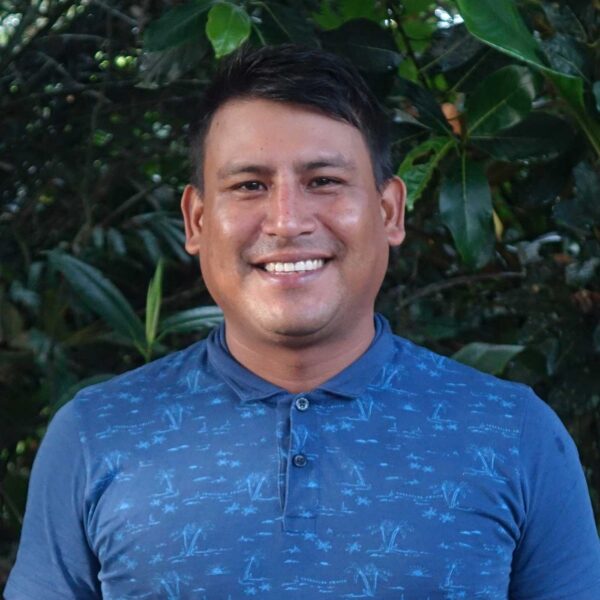
I joined RFUS in 2018 to support the transfer of territorial monitoring technology to Indigenous communities. I feel that RFUS’s mission is of vital importance to future generations and I value our emphasis on “learning while doing”—staying in communities to train Indigenous peoples, including supporting them as they learn to use the technology, and ensuring there is follow up. Every time I train Indigenous communities in the use of the monitoring technology, I feel joyful knowing that I am contributing and serving as an ally for the defense of forests and Indigenous peoples’ territories. Given the nature of our work, I also leave each community with a greater understanding of the lived experiences of the people there. My hope for 2023 is that we will connect with new allies to help sustain and expand upon our territorial monitoring work that improves the quality of life for our Indigenous partners and safeguards life on earth.
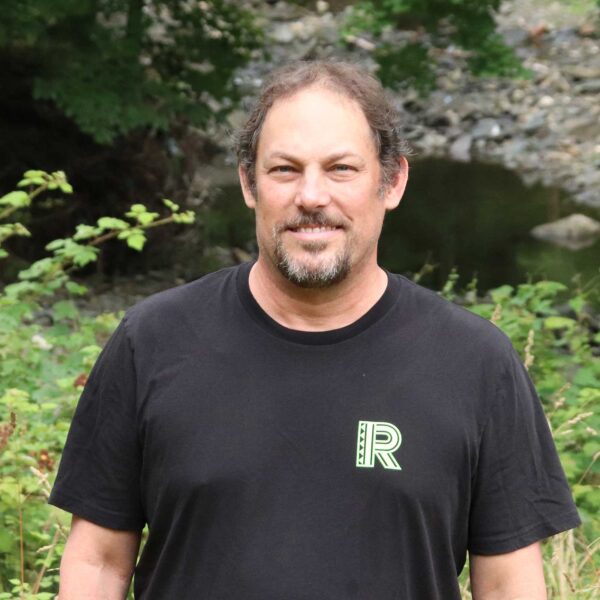
I’ve worked in human rights and conservation, mostly in Latin America, for over 30 years, and I’ve been at RFUS for seven of those years. Since 2016, I’ve been working with the Global Alliance for Territorial Communities and in Mexico and Central America. I also support RFUS’s efforts in Guyana. I feel strongly that defending forests by protecting Indigenous peoples’ lands and strengthening partner organizations is the best thing I can personally do to make a difference in the climate crisis. RFUS stands out in the forest protection space—not just because of our rights-based approach and focus on land rights, but also in the way we collaborate and foster long-term, effective partnerships built upon trust and mutual accountability. I’m honored to be able to work with our partners on organizational strengthening and capacity building, land rights, and advocacy around direct access to climate finance. Our partners and the Indigenous leaders who are defending their lands, forests, and communities constantly inspire me. I follow their lead, and then, when I can, I offer options for solutions that have worked for others. That’s where my decades of experience comes in handy. In the coming years, my hope is that more of our partners will be better equipped to receive direct funding. I’m proud to be a part of making that happen by offering capacity-strengthening trainings for our Indigenous partners on how to access and manage grant funds that are available.
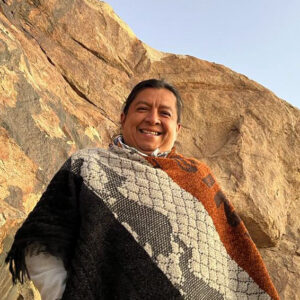
The Indigenous movement the Global Alliance of Territorial Communities (GATC) organically came together between 2015 and 2017, with the goal of representing 35 million people living in forest territories and defending over 958 million hectares of land. When the Global Alliance began to build its governance, RFUS was there, at the beginning, and now continues with us as a key player and our fiscal sponsor. The organization fulfills an important role in our work together. There aren’t many institutions that work within both a global and regional territorial framework like RFUS. Their support enables the GATC to expand how we approach forest protection, collaborating to coordinate programs not just regionally but across the globe. The experience that RFUS has is extremely important. It helps us to collaborate and envision ourselves in the future, not just in one region, but with tropical forests all over the planet.
GATC – Global Alliance of Territorial Communities
AMAN – Aliansi Masyarakat Adat Nusantara
APIB – Articulação dos Povos Indígenas do Brasil
COICA – Coordinadora de las Organizaciones Indígenas de la Cuenca Amazónica
CGTCEWP – Congreso General de Tierras Colectivas Embera y Wounaan de Panamá
CNPW – Congreso Nacional del Pueblo Wounaan
COONAPIP – Coordinadora Nacional de Pueblos Indígenas de Panamá
AMPB – Alianza Mesoamericana de Pueblos y Bosques
Utz Che’ – Asociación de Forestería Comunitaria de Guatemala
ACOFOP – Asociación de Comunidades Forestales de Petén
Red MOCAF – Red Mexicana de Organizaciones Campesinas Forestales
FEPROAH – The Federation of Agroforestry Producers of Honduras
Congreso General Ancestral Tule de Tagarkunyala
Naso People
CIR – Conselho Indígena de Roraima
APIB – Articulação dos Povos Indígenas do Brasil
APA – Amerindian Peoples Association
SRDC – South Rupununi District Council
NPDC – North Pakaraimas District Council
UMDC – Upper Mazaruni District Council
MDC – Moruca District Council
ORPIO – Organización Regional de los Pueblos Indígenas del Oriente
ORAU – Organización Regional Aidesep Ucayali
ECA-RCA – Ejecutor del Contrato de Administración de la Reserva Comunal Amarakaeri
AIDESEP – Asociación Interétnica de Desarrollo de la Selva Peruana
Saweto-Alto Tamaya
COICA – Coordinadora de las Organizaciones Indígenas de la Cuenca Amazónica
COIAB – Coordenação das Organizações Indígenas da Amazônia Brasileira
Your support has helped to strengthen Indigenous peoples’ organizations in their capacity to fight deforestation, climate change, and the systemic violation of their rights. RFUS and our partners couldn’t make such a substantial impact without you. Thank you!


All financial figures past and present can be found on Rainforest Foundation US’s fiscal year 990 filings on our Financials & Transparency page.
RFUS is tackling the major challenges of our day: deforestation, the climate crisis, and human rights violations. Your commitment moves us one step closer to creating a more sustainable and just future.
While all donations make an impact, please consider becoming a monthly donor. Monthly contributions provide vital and reliable aid to our Indigenous partners as they work to ensure that tropical forests can keep capturing and storing carbon while also producing fresh air and clean water for generations to come.
Rainforest Foundation US is committed to the highest standards of moral and ethical behavior and employs specific practices to combat the risk of financial irregularities. RFUS policy requires internal controls to prevent financial irregularities, including authorization, segregation of duties, reconciliation, monitoring, and safeguarding of assets in accordance with best practices. Additionally, all RFUS employees are encouraged to report any known or suspected financial irregularities, and have access to do so anonymously as outlined in our whistleblower policy.
Take Action NOW on rainforest protection and Indigenous peoples’ rights
Are you interested in other ways to support us?
Learn more here.



Get news, updates, and stories from the rainforest—straight to your inbox.
Land Acknowledgement
Rainforest Foundation US recognizes and honors the original peoples of the land on which our headquarters is based in Brooklyn, New York: The Ramapough Munsee Lenape, who have cared for these lands and waters for generations. We ask the Ramapough Munsee Lenape people’s permission to be here as their guests and ask their blessing for the good continuation of our work.
